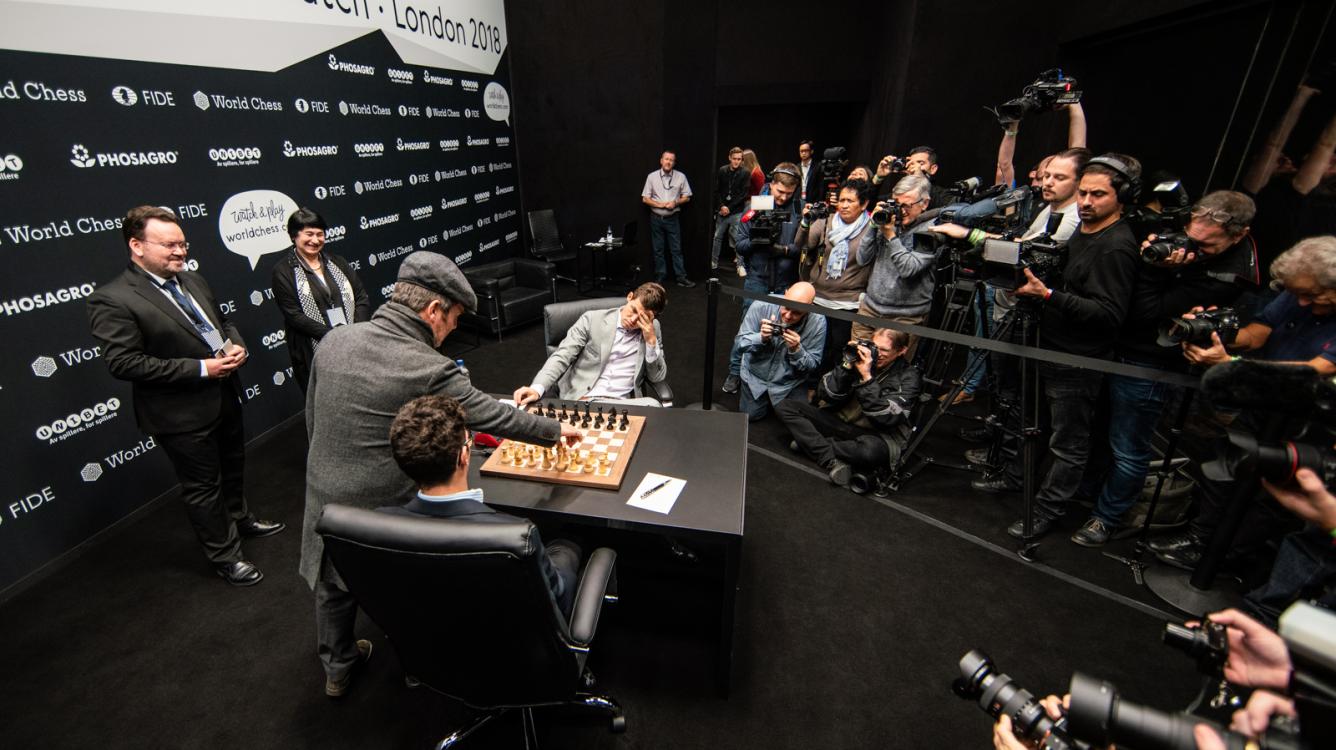
World Chess Championship Game 10: Draw Streak Continues Despite Wild Game
In the movie Children of Men, the U.K. goes 20 years without anyone being able to conceive a child. So far in the 2018 world chess championship, London has experienced a similar dearth. Two weeks in, and nobody has been able to birth a win.
There's not yet any rioting by chess fans, but there is frustration. And that is surely shared by the players. Five years to the day after he became world champion, Magnus Carlsen is finding his title defense stagnant against Fabiano Caruana.
One exceptional group that is surely content with today's draw: those holding tickets to round 12. The match is now guaranteed to go the full distance, and perhaps longer.
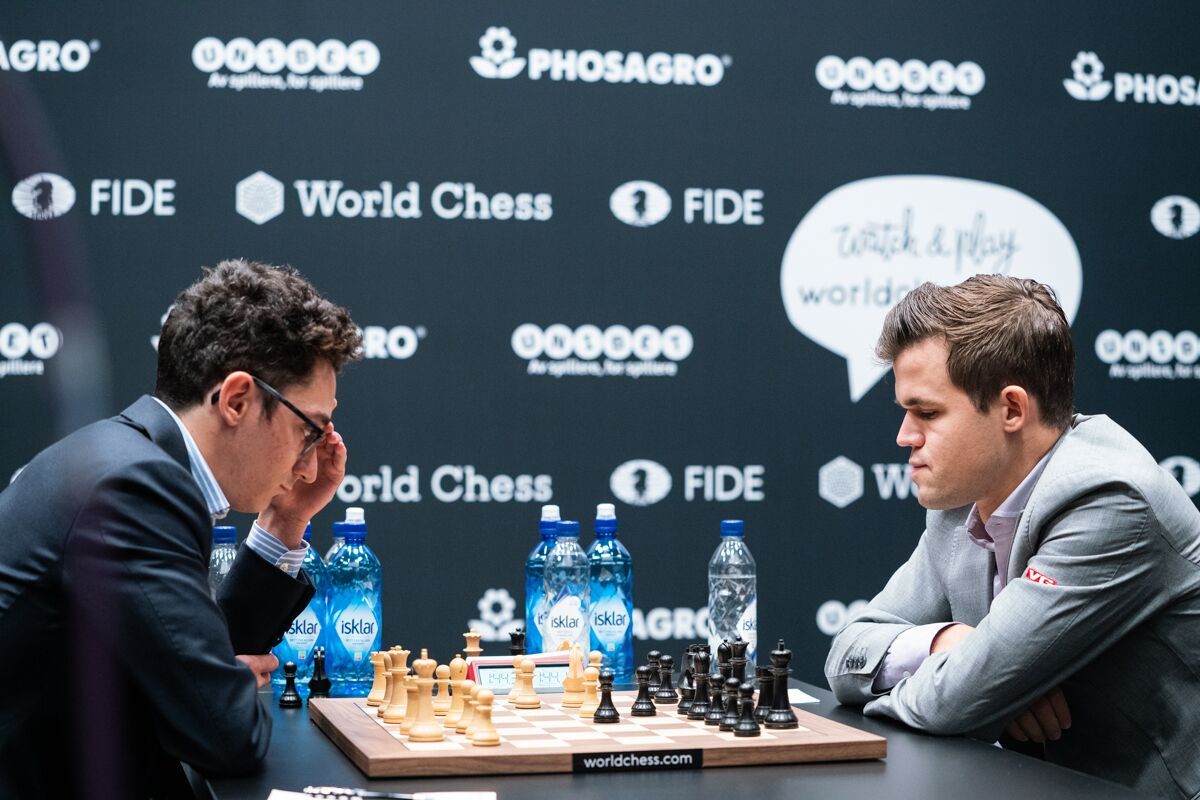
The b-pawns were the stars today in round 10. | Photo: Maria Emelianova/Chess.com.
Today, you can't say the players didn't try. In fact all three results were possible in the late middlegame, as Carlsen looked to ditch his entire queenside and go "true caveman" in his attack against Caruana.
Hikaru Nakamura used that term as he said, "I don’t see how this could possibly be drawn." Well, that's just how things are going this match—the players found a way.
#CarlsenCaruana pic.twitter.com/CSZJ4wJQg8
— Dan (@AntonSquaredMe) November 22, 2018
They've now extended the historic ignominious streak by drawing the first 10 games of the title bout. The score is 5.0-5.0 as each player retains one more chance with White in classical chess. Friday is a rest day so Carlsen will go first in game 11 on Saturday.
Today's game was the first time an American played a world championship chess match on Thanksgiving. But on a day where most in the United States relax and eat, the players avoided any tryptophan-rich foods and played energetic, uncompromising chess. There were no turkeys in the playing hall as both sides risked potential catastrophe.
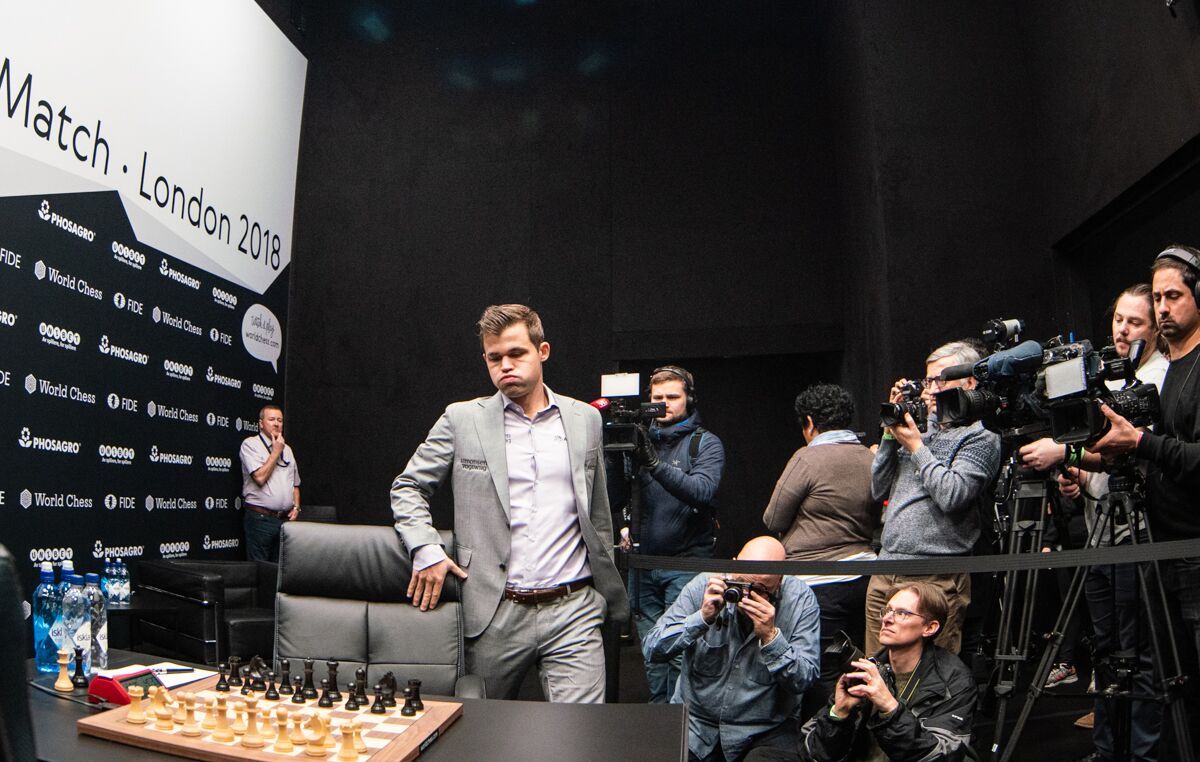
The champ enters the arena. | Photo: Maria Emelianova/Chess.com.
"It's the type of game I expected from this line," Caruana said. The variation in question was a reprise of game eight. Although he got an advantage in his last turn with White, it was the challenger who deviated first anyway. His 12. b4!? represented another surprise, and on the same move number as a few days ago. It was also his second time as White playing the same pawn thrust unexpectedly (once it came from a Rossolimo).
"I mean, it's very, very double-edged, both sides are taking risks," Caruana said about the resulting complications. "Black takes some very clear risks because he's going for an attack so he's sort of going all-in. And of course, I'm getting attacked, so I could potentially get mated."
Carlsen told Norwegian television that he had a lot of fear about losing the game today.
Carlsen: "I didn't play like someone who has been in several WC matches before." #CarlsenCaruana
— Tarjei J. Svensen (@TarjeiJS) November 22, 2018
The game enthralled past world champions:
- Hou Yifan: "Fabiano’s team is really confident in their home preparation, especially in the Sicilian."
- Garry Kasparov, commenting for the Saint Louis Chess Club on the possibility Carlsen's key idea of 21...b5, which sought to trade rooks and therefore remove a defender of f3: "If he does it he deserves to remain a world champion."
- Viswanathan Anand: "It’s not easy for me to evaluate. Practically it’s nice to be Black...It could easily go either way...The position is fascinating."
And Carlsen did go for ...b5! His thinking was a little less brainy, a little more gusto: "I thought for so long and I wasn't sure about it but I thought I just go for it and up the stakes even more. Either you win the game, or you get mated," he said.
Besides, he thought that if he played an alternative like 21...Kh8, he'd still have some long thinks coming up soon thereafter. Why not get going right away?
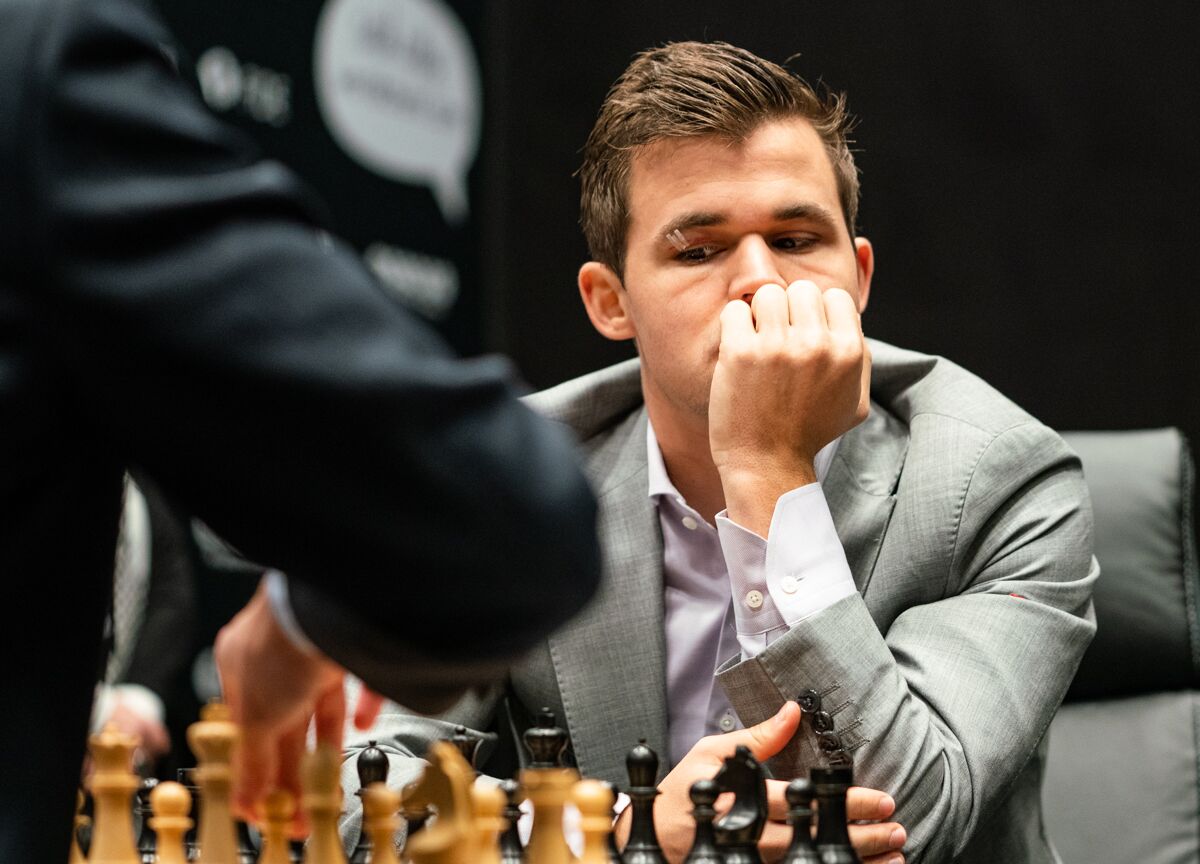
Carlsen's bandage got slimmer, but so did his chances to defend his title in regulation. | Photo: Maria Emelianova/Chess.com.
Carlsen also admitted that the thrust was partly based on the intractable results of the match, where neither player can seemingly avoid splitting the point.
This game could end in a draw still - but can we agree now, once and for all, this is not a dull match in need of 'fixing' somehow?! This is brutal, top-level chess at it's very best. #CarlsenCaruana
— Thomas Rendle (@TERendle) November 22, 2018
"It was partly based on the match situation," Carlsen said. "I felt that it would be, even though I had less time at this point, I thought it would be very unpleasant to face, but I didn't make it solely on psychology, of course."
Kasparov thought that type of move, where the resulting maelstrom couldn't possibly be controlled or calculated, was out of the style of both players.
"They prefer to play a different kind of chess," he said. "When they have to play positions that are not in their style, it takes (extra) time. And you have to add the pressure of world championship chess."

Carlsen reacts to post-game variations.| Photo: Mike Klein/Chess.com.
"I think there's a good chance Fabiano missed it," Hikaru Nakamura said of the move. Caruana dispelled that idea.
"When I went for Ra3 I was looking at this stuff," Caruana said. "I thought that ...b5, Nb6 would be bad for Black and that's why I was expecting ...Kh8." He said that passing the turn would have put the onus on White since "many of my moves have problems." Eventually, Caruana agreed that moving the b-pawn was "probably the right choice."
From there Caruana had several crises to solve. Should he take the pawn en passant, or a few moves later, with his bishop? How much could he get away with on the queenside and avoid collapse on his own king?
He ultimately decided against capturing it then, or later. (Caruana: "It feels kind of greedy.") Instead, it was time to hunker down and weather the Norwegian storm.
"When I played g3, it was such a difficult moment because after ...Qg5 I have so many options," Caruana said. "There's a lot of potential for attack [by Black] but it's still a bit slow and I have to decide how I want to set up my pieces. I think f3 was probably the best way to do it; I mean, after I played g3 I started to wish I had played f3."

Fabiano Caruana projected much more energy in the post-game press conference, even if his answers are generally less quotable. | Photo: Mike Klein/Chess.com.
And even after the many mates to consider, there was still a rich rook ending to navigate. It was truly a game with several chapters and sequels—make sure you also take a look at the dangerous tactics stemming from 35...Qe2, an idea which Caruana saw but didn't fully appreciate (the "only stupid moment" according to the American).
Chess.com had already planned for Maxime Vachier-Lagrave to analyze the game today. Luckily he's one of the world's leading experts on the Open Sicilian, and below he takes readers through this massive game and its myriad of possibilities.

About the ending, did Carlsen see tangible winning possibilities, or was it a bit like yesterday where he thought he'd give nominal pressure before acquiescing?
"I didn't particularly think I had real chances," the champion said. "I thought I'd try. Unfortunately on the moment that I played 44...Kd4, I discovered only after I played the move that 44...Rb8 was a move that would have at least passed the move on and it wouldn't have been that easy for him."
Unlike yesterday, a third result could have crept in, so Carlsen shut it down a little while later. "I could have lost it in the end," Carlsen told Norwegian television.
Want to understand the complicated game even more? Alex Yermolinsky needed a little more tape than usual for his post-game video analysis. Luckily, Chess.com went digital years ago:
Leading up to the ending, both players slipped below one minute and neither had more than a handful of seconds when making his 40th move.
"There was a little time pressure for sure," Carlsen said. "I cannot say I kept my cool one bit!"
That quote was notable as it represented the only time in the post-game press conference that he smiled. Unlike yesterday where his answers represented some annoyance, today Carlsen seemed just plain tired. He looked over at his team (Henrik Carlsen and Peter Heine Nielsen) several times during the interview session, and while Caruana answered a question, the champ even rested his head on his shoulder and closed his eyes.
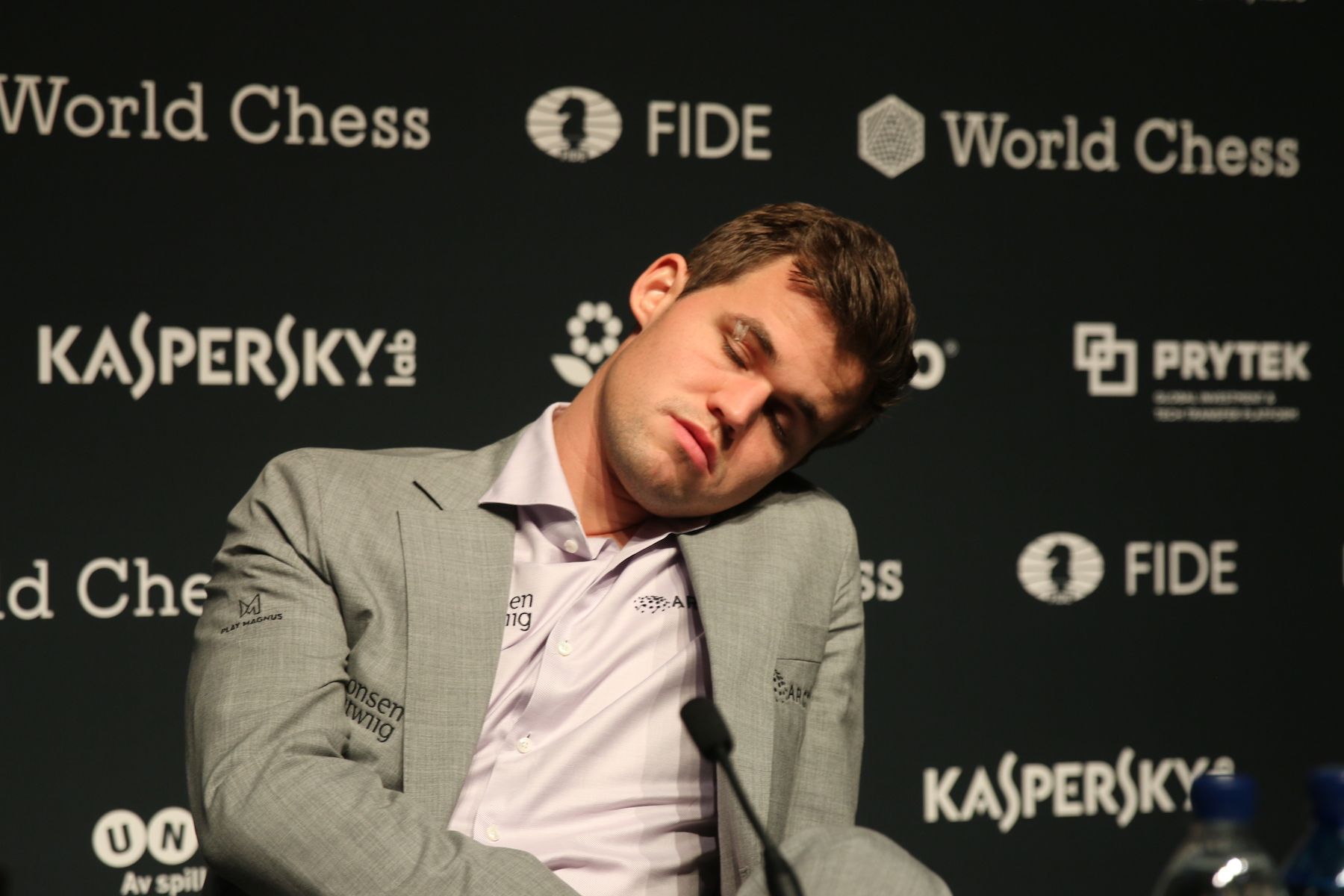
If 2014's world championship taught us anything, it's that Carlsen sleeps when he wants to sleep (his snooze only lasted a few seconds today). | Photo: Mike Klein/Chess.com.
Maybe he was humming the new tune that dropped today from chess-themed singer Juga. She seems to have jinxed the players as her "Isolated Pawn" yielded exactly zero of them today! Maybe on the b-side of that track she can similarly jinx the duo with a song called "Draw All Day, Draw All Night."
So what will Carlsen and his team conjure for his final turn with White? He's already tried 1. c4, 1. d4, and 1. e4. Recall that in game 12 in 2016 he essentially played a non-game, but this time around it is different since he won't get the final say with the first move.
As for all the draws, neither player wished to see the new idea of reversing the colors and playing again, but Carlsen did agree that the brevity of the match was influencing the play. With only a dozen games, any risks that backfire would leave either player in a serious hole. Carlsen said he wished for championship matches to be extended to 16 or 18 games.
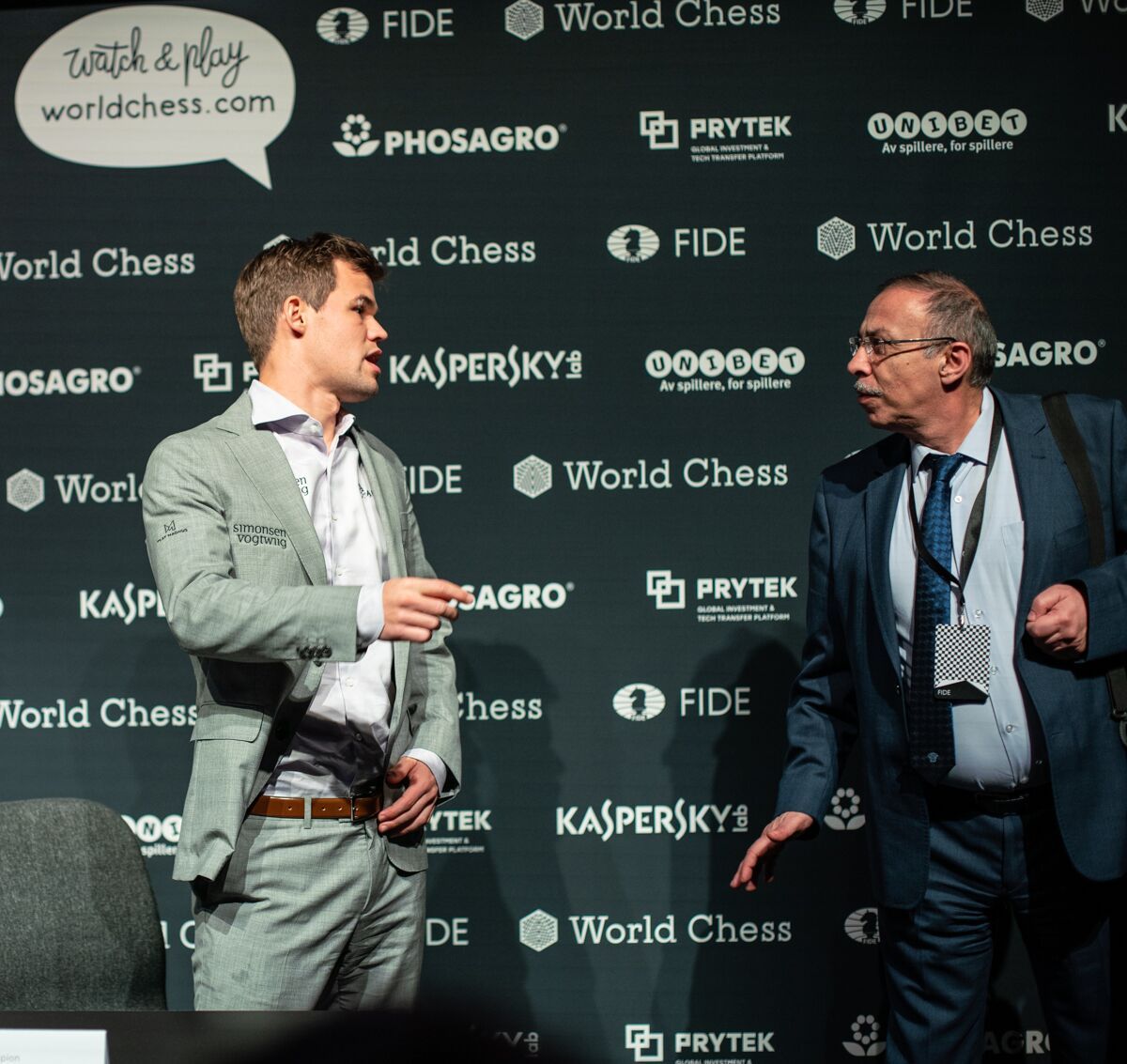
Carlsen briefly chatted with officials before the press conference began, but there would be no repeat of his early exit from the press conference like in 2016. He answered questions with thoroughness, even more so than yesterday. | Photo: Maria Emelianova/Chess.com.
As for Caruana, there will be no Thanksgiving celebration tonight. And that's not just because his team is made up entirely of foreign-born players (although Alejandro Ramirez does have American citizenship). It is simply due to his intense focus on the match.
"Thanksgiving for us is a week from now," Caruana's second Cristian Chirila told Chess.com. "We will feast then!"
From the Americans in @theworldchess media room... Happy Thanksgiving!!! pic.twitter.com/cKQRaQYvSG
— US Chess (@USChess) November 22, 2018
In Children of Men the infertility comes to all females, but is chess's highest stage fertile ground for women? The final question to the players came from a filmmaker who wanted to know if they could ever envision a woman competing for the same title.
"Right now, the current crop of players, it's hard to imagine," Carlsen said. "But in the future I don't see why not."
"In the future it's possible but right now there don't seem to be any players currently," Caruana said. "So many not in my time, but certainly one day."
Peter Doggers contributed to this report.
To follow the match, Chess.com has extensive coverage, including daily reports on game days right here on Chess.com/news. You can catch all of the moves live at Chess.com/wcc2018 and watch Chess.com's best-known commentators, IM Danny Rensch and GM Robert Hess, on either Twitch.tv/Chess or Chess.com/TV. Special guests, including Hikaru Nakamura, Hou Yifan, Maxime Vachier-Lagrave, Wesley So, Sam Shankland and more will be joining the live coverage on different days.
In addition, GM Alex Yermolinsky will be doing round-by-round wrap-up videos, available immediately after every round on all your favorite social platforms (Twitch, YouTube, Facebook and Chess.com).
The current U.S. chess champion GM Sam Shankland will provide written, in-depth analysis of each game in our news reports.
GM Yasser Seirawan will share his thoughts on the match standings and inner workings of how the players are approaching each game with videos, exclusive to Chess.com members, on each rest day.
Previous reports:
- How To Watch The World Chess Championship: Carlsen vs. Caruana
- Carlsen-Caruana Venue Set
- 2018 World Chess Championship Opens In London
- World Chess Championship Game 1: Caruana Struggles But Holds Draw Against Carlsen
- World Chess Championship Game 2: Carlsen 'Grovels' To Draw After Caruana's Opening Surprise
- World Chess Championship Game 3: Caruana Repeats Rossolimo But Can't Break Carlsen
- World Chess Championship Game 4: Draw Again Despite Release Of Caruana's Training Notes
- World Chess Championship Game 5: Caruana's Surprise Gambit Doesn't Break Impasse
- World Chess Championship Game 6: Caruana Misses 'Impossible' Win
- World Chess Championship Game 7: Another Queen's Gambit, Another Draw
- World Chess Championship Game 8: Carlsen Dodges Bullet In Sveshnikov Sicilian
- World Chess Championship Game 9: Another Draw Sets Record

